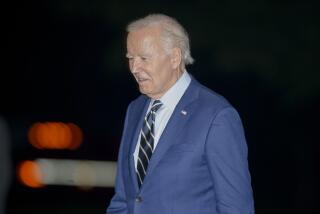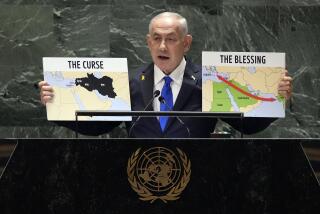Barrier to Peace Breached as Netanyahu, Arafat Meet
- Share via
EREZ CROSSING, Gaza Strip — After weeks of secret negotiations and last-minute crises, a stone-faced Prime Minister Benjamin Netanyahu met with Palestinian leader Yasser Arafat for the first time Wednesday, accepting him as a partner in peace.
The landmark meeting, which Netanyahu once vowed would never occur, began with a reluctant handshake across a wide table and proceeded with an hour of introductory talks to revive the formal peace negotiations, stalled since the right-wing Likud Party leader was elected as Israel’s prime minister in May.
None of the major issues dividing the two sides was resolved in the brief session. But the meeting marked Netanyahu’s first public commitment to work with the man he had long reviled as a terrorist. Afterward, the leaders appeared side by side for spare but conciliatory remarks.
“Our position is not only to move on the peace process but also to improve the prosperity and economic conditions of the Palestinian population,” Netanyahu said.
Arafat responded by congratulating the Israeli leader on his election and saying, “I believe that we and Mr. Netanyahu and his government can work together to advance the peace process.”
He noted it was the Likud government of former Prime Minister Yitzhak Shamir--of which Netanyahu was a member--that had initiated peace moves with the Palestinians in 1991 with U.S.-backed talks in Madrid.
Netanyahu refused to smile or look Arafat in the eye. He gripped the lectern with both hands during his appearance and exited without a final handshake, exhibiting none of the warmth evident in meetings between Arafat and Netanyahu’s predecessor, Labor Party leader Shimon Peres.
Still, the meeting marked Netanyahu as a pragmatist rather than an ideologue of the right wing and was viewed as a breakthrough. The peace process was ushered in three years ago with a reluctant handshake between Arafat and then-Prime Minister Yitzhak Rabin on the White House lawn. Rabin was assassinated in November by a Jewish law student opposed to the agreements that trade land for peace, and Peres became prime minister. Netanyahu campaigned against Peres with advertisements excoriating him for walking hand in hand with Arafat.
Now, Netanyahu has extended his hand.
“A psychological barrier was passed here,” said Norwegian diplomat Terje Larsen, who helped broker the Netanyahu-Arafat meeting. “The leader of the Likud shook hands with the leader of the Palestine Liberation Organization, and they faced the world together on television. I am satisfied, relieved and also completely exhausted.”
Larsen and his diplomat wife, Mona Juul, were key figures in negotiations between Arafat and the previous, Labor Party government that resulted in the historic 1993 Israeli-Palestinian peace accord. This time, they secretly hosted negotiators in their Tel Aviv apartment to hammer out an agreement to bring about the Netanyahu-Arafat meeting. The talks, which began Aug. 13 and ran day and night during the past week, were conducted by Netanyahu advisor Dore Gold and Arafat deputies Mahmoud Abbas and Saeb Erekat.
The two sides set an agenda for their negotiating teams, which are to begin meeting today. They are to tackle key issues such as Israeli troop redeployment from the West Bank town of Hebron, Israeli closure of the Palestinian-ruled West Bank and Gaza Strip, and security matters.
Netanyahu told Israeli reporters later that he decided to meet with Arafat only after the Palestinian leader agreed to discuss details of the long-delayed redeployment from Hebron, where 450 Jews live among 100,000 Palestinians.
Peres had agreed to withdraw troops from Hebron but then postponed the partial withdrawal in March after suicide bombings by Islamic extremists opposed to the peace process left more than 60 dead in Israel.
“We need to add security measures that would assure the security of the Jewish community of Hebron and our control of the holy places, and only when our view was accepted . . . this meeting became possible,” Netanyahu said.
Palestinian leaders quickly denied that they had agreed to reopen the issue that already was negotiated with the previous government. “We will not reopen issues that are in the interim agreement. If we do, it means we will not have an agreement anymore,” Erekat said in a later telephone interview.
Suspicion and mistrust between the sides characterized negotiations over the leaders’ meeting up to the last minute, sources close to the talks said. Early Wednesday, Netanyahu demanded an apology from Arafat for an editorial that had appeared in the Palestinian newspaper Al Ayyam calling the prime minister “more Nazi than Hitler.”
When Arafat telephoned to apologize, Netanyahu was in a Cabinet meeting and declined to take the call, offending Arafat, who then refused to phone again. Netanyahu canceled the meeting two hours before it was to start. Arafat finally called.
Then, at the news conference, Arafat aides suddenly realized the lectern for the Palestinian leader was smaller than Netanyahu’s--and not bulletproof, and he demanded equality. Workers hastily replaced Netanyahu’s; the two men finally appeared.
“There have been many ups and downs, but the important thing is that people who have previously regarded each other as bitter enemies engaged in a process of working together,” said a source close to the negotiations.
Netanyahu was under pressure from the United States and Egypt to meet with Arafat to put the internationally backed peace process on track again. Israeli President Ezer Weizman had said he would receive Arafat if Netanyahu did not.
But Netanyahu faced criticism from some members of his party. He will face them today at a meeting of the Likud leadership.
Times staff writer Rebecca Trounson in Jerusalem contributed to this report.
More to Read
Sign up for Essential California
The most important California stories and recommendations in your inbox every morning.
You may occasionally receive promotional content from the Los Angeles Times.













